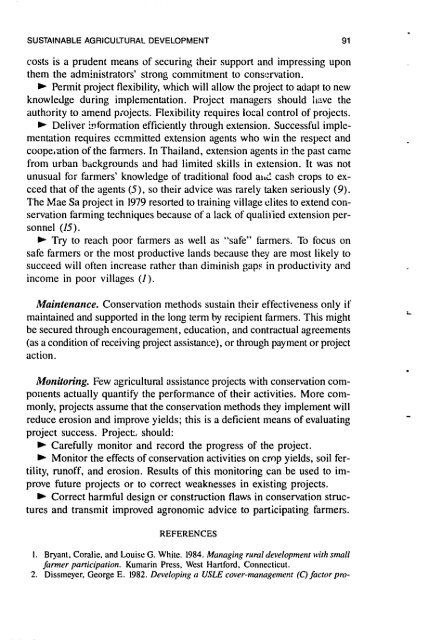Conservation farming on steep lands - USAid
Conservation farming on steep lands - USAid
Conservation farming on steep lands - USAid
Create successful ePaper yourself
Turn your PDF publications into a flip-book with our unique Google optimized e-Paper software.
SUSTAINABLE AGRICULTURAL DEVELOPMENT 91<br />
costs is a prudent means of securing their support and impressing up<strong>on</strong><br />
them the administrators' str<strong>on</strong>g commitment to c<strong>on</strong>scrvati<strong>on</strong>.<br />
b Pennit project flexibility, which will allow the project to adapt to new<br />
knowledge during implementati<strong>on</strong>. Project managers should I~rive the<br />
authxity to amend piojects. Flexibility requires local c<strong>on</strong>trol of projects.<br />
Deliver informati<strong>on</strong> efficiently through extensi<strong>on</strong>. Successful implcmentati<strong>on</strong><br />
requires ccmmitted extensi<strong>on</strong> agents who win the respect and<br />
coopelati<strong>on</strong> of the farmers. In Thailand, extensi<strong>on</strong> agents ir! the past came<br />
from urban b;rckgrour.ds and had limited skills in extensi<strong>on</strong>. It was not<br />
unusual for farmers' knowledge of traditi<strong>on</strong>al food aid cash crops to exceed<br />
that of the agents (5), so their advice was rarely taken seriously (9).<br />
The Mae Sa project in 1979 resorted to training village clites to extend c<strong>on</strong>servati<strong>on</strong><br />
<str<strong>on</strong>g>farming</str<strong>on</strong>g> techniques because of a lack of qualiried extensi<strong>on</strong> pers<strong>on</strong>nel<br />
(15).<br />
Try to reach poor farmers as well as "safe" farmers. To focus <strong>on</strong><br />
safe farmers or the most productive <strong>lands</strong> because they are most likely to<br />
succeed will often increase rather than diminish gap!: in productivity ar.d<br />
income in poor villages (I).<br />
Maintenartce. <str<strong>on</strong>g>C<strong>on</strong>servati<strong>on</strong></str<strong>on</strong>g> methods sustain their effectiveness <strong>on</strong>ly if<br />
maintained and supported in the l<strong>on</strong>g term by recipient farmers. This might<br />
be secured through encouragement, educati<strong>on</strong>, and c<strong>on</strong>tractual agreements<br />
(as a c<strong>on</strong>diti<strong>on</strong> of receiving project assistance), or through payment or project<br />
acti<strong>on</strong>.<br />
M<strong>on</strong>itoring. Few agricultuml assistance projects with c<strong>on</strong>servati<strong>on</strong> compoiients<br />
actually quantify the performance of their activities. More comm<strong>on</strong>ly,<br />
projects assume that the c<strong>on</strong>servati<strong>on</strong> methods they implement will<br />
reduce erosi<strong>on</strong> and improve yields; this is a deficient means of evaluating<br />
project success. Project:, should:<br />
b Carefully m<strong>on</strong>itor and rccord the progress of the project.<br />
M<strong>on</strong>itor the effects of c<strong>on</strong>servati<strong>on</strong> activities <strong>on</strong> crop yields, soil fertility,<br />
runoff, and erosi<strong>on</strong>. Results of this m<strong>on</strong>itoring can be used to improve<br />
future projects or to correct weakr~esses in existing projects.<br />
Correct harmful design cr c<strong>on</strong>structi<strong>on</strong> flaws in c<strong>on</strong>servati<strong>on</strong> structures<br />
and transmit improved agr<strong>on</strong>omic advice to participating farmers.<br />
REFERENCES<br />
I. Bryant. Coralie, and Louise G. White. 1984. Managing ricml development brith small<br />
j~nner panicipati<strong>on</strong>. Kumarin Press, Wcst Hartford. C<strong>on</strong>necticut.<br />
2. Dissmeyer, George E. 1982. Developir~g a USLE cover-mnanagement (C) factor pro-
















